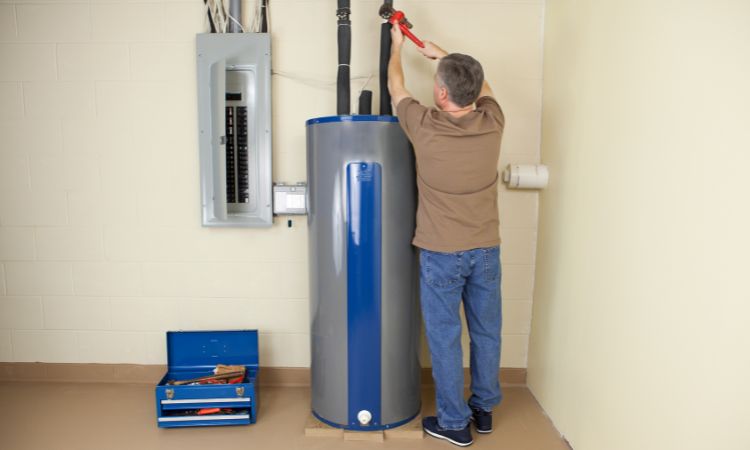Overcoming Everyday Heater Troubles
Overcoming Everyday Heater Troubles
Blog Article
What are your ideas with regards to Water Heater Repair and Troubleshooting?

Picture starting your day without your routine warm shower. That already sets a poor tone for the remainder of your day.
Every house needs a dependable water heater, but only a few know how to handle one. One easy way to keep your water heater in top shape is to check for faults frequently and fix them as soon as they appear.
Keep in mind to shut off your water heater before sniffing about for mistakes. These are the hot water heater mistakes you are probably to run into.
Water too hot or too cool
Every hot water heater has a thermostat that establishes just how hot the water gets. If the water coming into your residence is also hot despite setting a practical maximum temperature level, your thermostat could be defective.
On the other hand, as well cold water may be due to a fallen short thermostat, a broken circuit, or improper gas circulation. For example, if you use a gas water heater with a busted pilot burner, you would obtain cold water, even if the thermostat remains in ideal condition. For electrical heaters, a blown fuse may be the perpetrator.
Inadequate warm water
Water heaters can be found in many sizes, depending upon your hot water demands. If you run out of hot water prior to everyone has had a bathroom, your water heater is also little for your family size. You must take into consideration setting up a bigger water heater container or choosing a tankless hot water heater, which uses up less area and is much more sturdy.
Strange noises
There are at the very least five kinds of sounds you can speak with a hot water heater, but one of the most typical interpretation is that it's time for the water heater to retire.
First of all, you must know with the regular sounds a hot water heater makes. An electrical heating unit may sound different from a gas-powered one.
Popping or banging audios normally suggest there is a slab of debris in your storage tanks, as well as it's time to cleanse it out. On the other hand, whistling or hissing sounds might merely be your valves allowing some stress off.
Water leaks
Leakages could originate from pipelines, water links, shutoffs, or in the worst-case situation, the container itself. With time, water will rust the container, and find its way out. If this happens, you need to change your water heater asap.
Nevertheless, prior to your modification your entire storage tank, make sure that all pipes remain in place which each shutoff works completely. If you still require help recognizing a leak, call your plumber.
Rust-colored water
Rust-colored water implies one of your water heater components is rusted. It could be the anode pole, or the container itself. Your plumber will be able to identify which it is.
Warm water
Despite just how high you set the thermostat, you will not get any type of hot water out of a heating unit well past its prime. A hot water heater's effectiveness may lower with time.
You will additionally get lukewarm water if your pipes have a cross connection. This suggests that when you turn on a tap, hot water from the heating system moves in alongside regular, cold water. A cross connection is simple to area. If your hot water faucets still follow closing the water heater shutoffs, you have a cross link.
Discoloured Water
Corrosion is a significant reason for filthy or discoloured water. Deterioration within the water tank or a stopping working anode pole could cause this discolouration. The anode pole protects the tank from rusting on the inside and need to be examined yearly. Without a rod or an effectively functioning anode rod, the hot water swiftly rusts inside the storage tank. Call a professional water heater service technician to establish if replacing the anode rod will fix the issue; otherwise, replace your hot water heater.
Conclusion
Preferably, your water heater can last 10 years prior to you require a change. Nevertheless, after the 10-year mark, you may experience any of these faults a lot more frequently. Now, you need to include a new hot water heater to your budget.
How To Troubleshoot 3 Common Water Heater Problems in Twin Cities
The Water Heater Is Leaking
A leaky cold water inlet valve A loose pipe fitting A leaky temperature and pressure relief valve A corroded anode rod A cracked tank Turn Off Your Water Heater:
Shut off your gas water heater by turning the gas valve on the unit to the “OFF” position. Shut off your electric water by switching its power off at your electrical panel. Look for a two-pole breaker labeled “water heater” and turn it to the “OFF” position. Move the ball valve connected to the water heater to be perpendicular to the piping at a 90° angle. Look for the Leak:
Depending on whether the water is coming from the tank's top or bottom, you’ll want to look for the leak in different locations.
If the leak comes from the top of the tank, carefully look for water escaping from the cold water inlet valve or loose pipe fittings. Rusted hot and cold water valves can have loose connections with the tank, with water leaking out of them.
https://mspplumbingheatingair.com/blog/how-to-troubleshoot-3-common-water-heater-problems
Do you like more info about Common Problems with Tank Water Heaters? Give feedback further down. We'd be interested to know your insights about this posting. We are looking forward that you come back again before long. Enjoyed our article? Please share it. Help another person check it out. Thanks a lot for taking the time to read it.
Book Your Installation Report this page